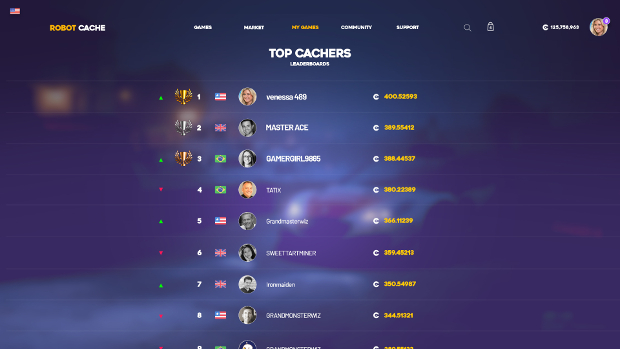Steam alternatives are cropping up all over the place, so let’s throw one more into the ring. Robot Cache officially began signups for its early access period. Why should you care? Well, players can sell used games, developers get to keep 95% of a game’s revenue, and there’s a cryptocurrency involved.
Yes, a cryptocurrency. If you go to the Robot Cache website, it even says it’s “the world’s first blockchain-based digital marketplace for video games”.
The cryptocurrency in question is called Iron, and apparently is pegged to the euro. Players can mine Iron or earn it in other unspecified ways, then spend it on games at Robot Cache.
Other features are more intriguing though. Steam’s 30% revenue cut has long been a sore spot with publishers, prompting companies like EA and Epic to make their own storefronts. Robot Cache isn’t the first Steam alternative to offer a better revenue split, but it’s still an important point in its favour, especially when it comes to wooing developers onto the platform.
Selling your used games is probably the make-or-break point for Robot Cache though. Nobody allows sales of used digital games, because what does “used” even mean in the context of a digital license? Your copy of the game is no different and has no more inherent value than one sold directly by the publisher, so why shouldn’t the publisher control the price?
On the other hand, one of the complaints levied against physical used games is that the publisher doesn’t make money after the first sale. That’s not the case with Robot Cache. Since it’s a digital marketplace, the publisher still takes a cut of the second sale, the third, the fourth, and so on. A sizable cut, too. Going off Robot Cache’s website, the player only gets 25% of the sale, with the remaining 75% presumably divvied up between the storefront and the publisher.
Still, it’s an interesting compromise. People get a bit of money back in their pocket after finishing a game, and the publisher doesn’t lose too much money on that second sale.
For now, it’s all about whether publishers and players alike sign up. Some familiar names are already involved, including Paradox, THQ Nordic, 505 Games, and Versus Evil.
IDG News Service








Subscribers 0
Fans 0
Followers 0
Followers